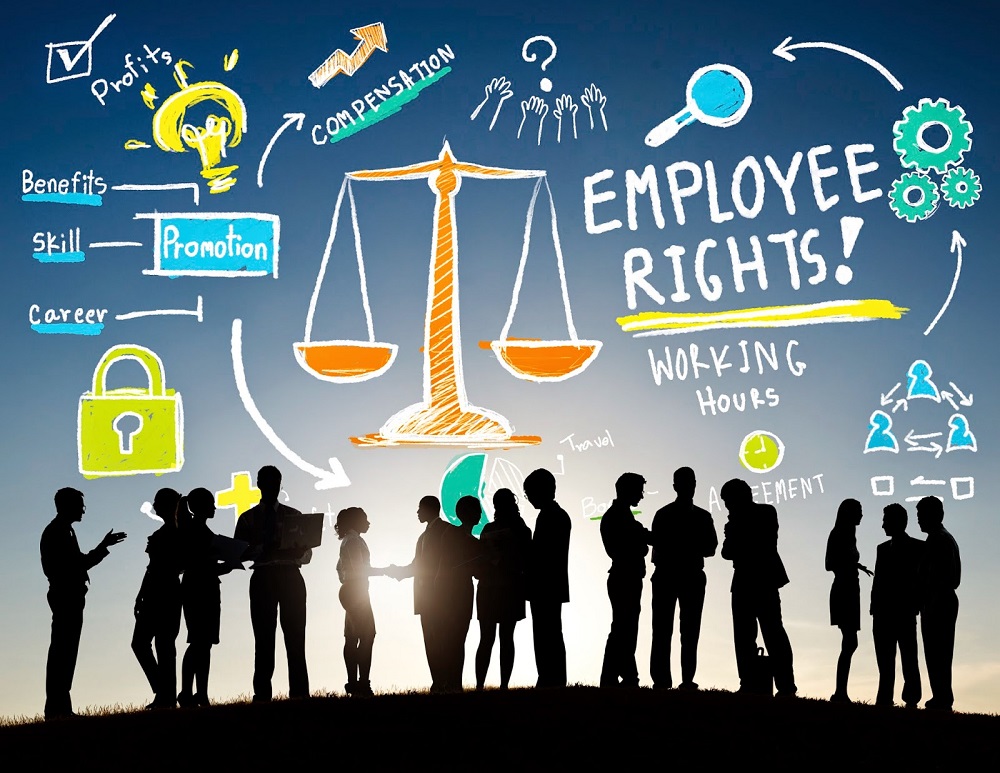America’s Poverty Dependence
Our love for cheap goods and services requires lots of people willing to work for very little.

In the latest episode of his podcast, “Employers Are Begging for Workers. Maybe That’s a Good Thing,” Ezra Klein talks with Cornell political scientist Jamila Michener about the basic assumptions that Americans make about how the economy should work. Much of it, including that Klein and Michener don’t hedge as to the “maybe,” is rather unsurprising. But there are some useful insights in the conversation. The key one, though, is this premise:
Our economy relies on poverty, or at least the threat of poverty, to force people to take bad jobs at low wages. And we say we’re doing it for their own good. Work is good for you. We’re teaching you skills, but we’re also doing it for our own good, because we like cheap stuff, we like plentiful services.
And the cheap goods and plentiful services we have in this economy, or have had at least before Covid, they’re only possible, at least in the way we’ve had them, if a lot of people work crummy jobs at low wages. And when we even see glimmers that workers are getting the power, through policy or unions to say no to that, a lot of powerful people in the economy freak out all at once and policymakers begin to respond.
There’s a whole lot more to the conversation, which I encourage you to either read or listen to in its entirety, than I have time to get into right now but it all flows from that premise and questions that surround it. That’s also a useful lens through which to view a feature in the NYT, by Kevin Roose, titled “Farewell, Millennial Lifestyle Subsidy.”
A few years ago, while on a work trip in Los Angeles, I hailed an Uber for a crosstown ride during rush hour. I knew it would be a long trip, and I steeled myself to fork over $60 or $70.
Instead, the app spit out a price that made my jaw drop: $16.
Experiences like these were common during the golden era of the Millennial Lifestyle Subsidy, which is what I like to call the period from roughly 2012 through early 2020, when many of the daily activities of big-city 20- and 30-somethings were being quietly underwritten by Silicon Valley venture capitalists.
For years, these subsidies allowed us to live Balenciaga lifestyles on Banana Republic budgets. Collectively, we took millions of cheap Uber and Lyft rides, shuttling ourselves around like bourgeois royalty while splitting the bill with those companies’ investors. We plunged MoviePass into bankruptcy by taking advantage of its $9.95-a-month, all-you-can-watch movie ticket deal, and took so many subsidized spin classes that ClassPass was forced to cancel its $99-a-month unlimited plan. We filled graveyards with the carcasses of food delivery start-ups — Maple, Sprig, SpoonRocket, Munchery — just by accepting their offers of underpriced gourmet meals.
There’s a whole lot more to it but that’s the setup: the “app economy” was highly subsidized by venture capitalists and youngish users enjoyed extraordinarily low prices for luxury goods for awhile. And now those subsidies are disappearing, as the market has shaken out weaker competitors, and customers are being hit with sticker shock.
But missing from this emphasis on what rich investors were doing is that fact that it meant that people on the front end of the app—the various drivers, delivery folks, restauranteurs, etc.—were subsidizing this lifestyle with cheap labor and crummy working conditions. That this is coming to an end may well be a good thing.
Klein and Michener ultimately winds up with discussions we’ve had here from time to time: What does the future of work look like? What is the minimum standard of life that people should get just for being alive, regardless of whether they’re productive members of society or even good people? These aren’t new questions, by any means, but changes in technology put them in a new light on a regular basis.





It’s also worth noting that we (as a nation) have effectively also been subsidizing many of these low-wage (or gig economy) folks as a whole via the Social Safety Net. Walmart’s low wages mean that many of its employees are making up the wage gap through services like SNAP.
This isn’t an argument against a robust social safety net. Just point out how large employer have been taking advantage of it for year.
The standard bearers of laissez faire free market capitalism, often eschew the need for labor regulations, among many others, with the claim that employers that don’t pay decent salaries and benefits will fail to attract sufficient and/or competent workers their companies need in order to work.
So why is the opposite happening?
Advocates of free market fundamentalism like to describe market mechanisms as win-win voluntary exchanges between equals.
Yet the marketplace is also described (often by the same people) as a place where the “customer is always right!” and where “cash is king!”
Which is an implicit admission that Capital is always superior to Property which is superior to Labor.
Aside from temporary blips, Labor will never be able to exchange with Capital on a level footing without some sort of intervention.
A few weeks ago when R governors began reducing unemployment benefits in order to try and force people to take jobs, there was an article pointing out that those govs were proving Marx right, that capital seeks to maintain a pool of needy labor that can be used to suppress wages. The Klein-Michener discussion is an update and expansion on uncle Karl’s contention.
@Sleeping Dog: beat me to it.
We have two adult kids. One works her ass off at a grocery store, currently doing the graveyard shift stocking for $17 an hour, but we pay her rent and health insurance and she has a car we bought and insure. The other is engaged in playing games online and bitching about gentrifying capitalists (like us). We pay her way entirely.
We’re on a sort of retrospective trip at the moment, passing through places where we were poor and desperate. This has had the effect of reminding us just what fucking idiots we were and for how long. (I started writing at 34.) So it’s bought the gamer daughter another year of forbearance.
Neither of us is the sort of old person who believes that because we had to eat shit, our kids would profit by also eating shit. But we’ve had to think about whether by subsidizing our kids we’re depriving them of. . . I don’t know, misery? I mean, I was miserable a lot and look how I turned out. Eventually. In my 40’s.
Is there some inherent virtue in J putting hot dog relish on shelves at 2 AM? Is there something inherently wrong about C thinking, ‘my folks have money, why should I suffer?’ Which future are they facing, one where many people do hard jobs that don’t pay the bills? Or a future where a diminishing number of people work and are supported by something like a UBI?
IOW, just exactly how are we screwing up as parents, because it’s a given that we’re screwing up in ways that will be related in detail to various shrinks (that we’ll pay for). The times they are a changin’, but I do kind of need a weatherman to tell me which way the wind is blowing.
George Packer has an article at Atlantic dividing the country politically into four Americas. Seems to be drawing a fair amount of comment. Paul Campos at LGM has a post up noting that Packer seems to have left the non-white working class, a quarter of the population, out of his scheme. I think it was Dr. Krugman who observed, in the context of raising the SS retirement age, that he could understand a Congressman or CEO wasn’t friends with the elderly black janitor. But couldn’t they even see him? How many times have we seen a political commentator say blue collar workers supported Trump? Wrong. The working class heavily favored Biden, and Hillary before him. The white working class supported Trump. They’re supposed to accept a higher risk of COVID for the honor of being essential workers, be grateful for their shitty pay, and keep quietly out of sight.
@Michael Reynolds: Why is the one kid working manual labor overnight? Is she further along the path of parents beginning to shove her out of the nest, or is there an actual desire to do this job?
If the latter, I am very curious about her motivations. Playing video games and complaining about capitalists is apparently an option…
I don’t think there is any particular dignity to work in and of itself. Work is a means to an end — money to live on, maybe change the world, that’s about it. Putting hot dog relish on a shelf at 3am is seldom a goal in and of itself. Unless, somehow it is?
A lot of this goes back to the “just world hypothesis” that seems baked into human psychology. On some level, we all have a subconscious belief that someone who is suffering most have done SOMETHING to bring it on. People aware of this bias can recognize it when it is happening and try to counteract it, but most people are just on autopilot and, while they probably wouldn’t explicitly describe their beliefs this way, aren’t very introspective and thus fall into a default “the poor deserve to be poor” mentality.
And another aspect (well, I think they are related) is that there is a massive division in a lot of goods (and services, for that matter) between cheap but shoddy and well made (? or at least prestige branded?) but incredibly expensive.
I suspect that going forward there may be considerable room for fairly well skilled craftspeople plus scaled automation and distribution systems to fill a market for “pretty good but not horrendously priced” goods.
Part of a longer term economic adjustment: more concern for energy economics etc and the fact that economic growth IMO is inherently sigmoid.
People are NOT going to buy ten cars or fridges or whatever per household, they are NOT going to replace them at increasing rates, they ain’t going to buy new clothes every day (except possibly one niece of mine…)
Demand for positional goods may be almost inexhaustible; BUT by there very nature the supply is capped.
Obviously there’s a lot of room for expansion to meet real human need, even in the richest countries. Though perhaps the slower relative growth of Europe to USA is because basic needs are less starkly unfulfilled for some.
But once they are met, IMO the current economic model must evolve in a sensible manner, or collapse chaotically.
@Michael Reynolds:
When our first child was born his mother and I maintained an imaginary little book, in which we would remind each other to write down each of our parenting errors so that when our son ended up on some therapist’s couch, we could just give him the book to hand to his therapist, thus skipping ahead in the process.
@Michael Reynolds:
1) I don’t worry about what goes on inside households where I’m not paying the bills.
2) If asked, I would say there needs to be a balance, and what that balance is depends on many factors, none of which I’m privy to unless I’m living in the household, which is a big reason for rule 1.
@Michael Reynolds:
It’s a strong and standard philosophy in the service industry (especial retail and F&B) that everyone should be forced to work in the service industry for a year–to learn respect for others.
When you’ve been the person schlepping the food or dealing with the bitch at the returns counter, you understand how to behave when you’re the one order the food or returning the toaster.
I’m not sure about virtue, but there is a significant value to J putting relish on the shelves at 2AM–she knows that, should all your money go away, she can still make her own.
By the end of my time in China, I was making good money–not great, but good–doing marketing and PR for international companies. When I came home, nobody would hire me. I was too old and “too experienced” (i.e., “too expensive”). I had one company offer me “only” twice what I had been making a year before–and be sheepish that it’s all they could afford. I replied with “That’s what I was expecting, it’s in line for this market.” They didn’t hire me.
After 6 months, my nice buffer was gone. So… at 50 years old, I went down to the local grocery store and applied for a job. I spent 2 years wrapping meat and stocking shelves. And paying the mortgage, and buying food, and even affording a little fun.
My sister turned me on to a job where she worked (I’d applied here 3 times before, for high-level positions). I got a job as an admin–glorified secretarial pool. But… because I never say “no” when I’m asked to do something, all the VPs know my name–and come to me with special projects. The CFO and CEO stop by to chat. This is because I washed dishes and scrubbed toilets as a kid. I learned that hard work and a good attitude gets you noticed.
Last week, I got a 15% “equity adjustment” because I know how to put in the time and effort (without burning out) to get things done. I’m one of a handful in a company that spans 3 continents who got this.
So… yeah. If J does the work, keeps her eyes open, and takes advantage of the opportunities that come by, those nights tossing relish on shelves will serve her well.
@Mu Yixiao: @Gustopher:
It’s my fault J is working – I taught her my work ethic. During the worst of Covid we offered to cover her entirely, but she likes a degree of independence, and she’s a social creature. But I brainwashed her pretty well on the inherent value of work. I still believe in that – for me. I’m not entirely sure I believe in it for everyone, not sure it’s a universal value. But for me work was the only thing that made sense – it wasn’t emotional or weird like family, it wasn’t dull and pointless like school. I did stuff, got paid, enjoyed freedom.
But I’m leery of being like a father in 1910 berating my kids for not knowing how to shoe a horse. Or, say, a Mongol dad in the 13th century not knowing how to cut the head off a Bulgar.
@Michael Reynolds:
Cutting the heads off of Bulgars?
Tsk! How outdated; shoot ’em full of arrows with a compound bow, it’s the modern thing, sez Batu Khan!
@Michael Reynolds:
Cutting the heads off of Bulgars?
Tsk! How outdated; shoot ’em full of arrows with a compound bow, it’s the modern thing, sez Batu Khan!
@Michael Reynolds:
Cutting the heads off of Bulgars?
Tsk! How outdated; shoot ’em full of arrows with a compound bow, it’s the modern thing, sez Batu Khan!
@mattbernius: Next, you’re going to try to tell us that if we really wanted to shrink the cost of the social safety net, we’d need to start paying more people living wages with good benefits to begin with. But that’s just ridiculous. How are the uber wealthy going to expand their wealth if they have to pay workers living wages? Much better to transfer the cost onto all of the taxpayers (or future generations–we can deficit finance this, ya kno’) with a UBI or something like that.
@Michael Reynolds: “Is there some inherent virtue in J putting hot dog relish on shelves at 2 AM?”
No, but if nobody is doing it, there won’t be any at 9 am when the store opens up. There was no inherent virtue in loading trucks with lettuce and apples from 7 to 4 am either. I did it for just a dollar less per hour than J does now, only 4o years ago–went rent was 25% of what it is now. It’s nice that you can afford to subsidize your kids. I wish every kid had that situation. Most don’t.
@Just nutha ignint cracker:
Back around 1995-ish worked a few weeks loading chocolate on the night shift at a main distribution cold storage warehouse near one of the UK’s main motorway junctions.
Lessons learnt:
– the smell of chocolate gets really old really damn quick
– security guards at a chocolate warehouse are a proper PITA
– at 4am in the morning just outside the door of a refrigerated monolith, a cigarette truly is a friend
– its better to be a
FTLFLT driver than a foot-soldier, as it were– but money is still p*ss poor, all things considered
– definitely going for that mature entry BA
As one who swung a 24 oz framing hammer for 35 years, I won’t say much here. Y’all have heard it all before from me. A recent conversation about some chest X-rays with the nurse who works at my local clinic comes to mind tho:
N: Your chest x-rays showed several old fractures to your ribs.
OH: No shit. How many?
N: It doesn’t say, just that they are on both sides.
I’m not trying to make a particular point here, not even sure this has any real meaning, but saying, “I got hurt on the job.” too often is a sure ticket to the “out of work” list, so one is incentivized to suck it up and pretend that all is OK and hope that nobody notices one is moving a little slow or has a kink in their side.
Lifting walls with 2 broken ribs… Sucks.
Note the buried lede here in the middle of a bunch of quotes about other stuff, and irrelevancies about Silicon Valley venture capital nibbling at the margins.
Adam Smith nailed this one, 250 years ago. When the legislature sides with the workers, they invariably do good. When they side with the owners, they almost never do good.
@Michael Reynolds:
The value of work is what you get paid.
Not always just money — but mostly money. Social aspects and the opportunity to help others, the opportunity to learn, the cute boy at the deli counter, spiffy uniforms, and a bit of respect… those are there too. But, generally, it’s money, and the freedom that money can buy.
But if money isn’t the option, why would someone choose that job? It’s good, honest work, and there’s nothing morally wrong with it near as I can tell, but it doesn’t have much other than money, and not that much of that either.
I was part of the Park Slope Food Coop, and everyone had to do a work shift every four weeks, and it was kind of fun pretending to be blue collar for a few hours, but I never thought it would remain fun on a daily basis.
My favorite task was stocking the vitamins and snake oils — everything was organized by what it was alleged to be good for, which was never printed on the bottle because that would be a medical claim. “What do you think kudzu pills are good for?”
Everything old is new again.
—Karl Marx, Capital, vol. 1
@OzarkHillbilly:
There’s good reason why one of the most cherished gains in the UK post-war “settlement” was industrial injury benefit as part of the national insurance system.
Plus union/company deals, of course.